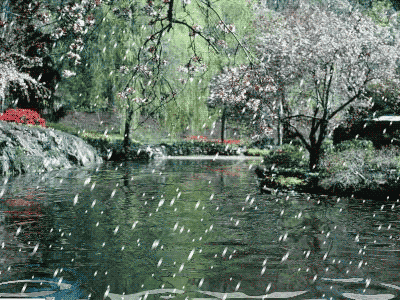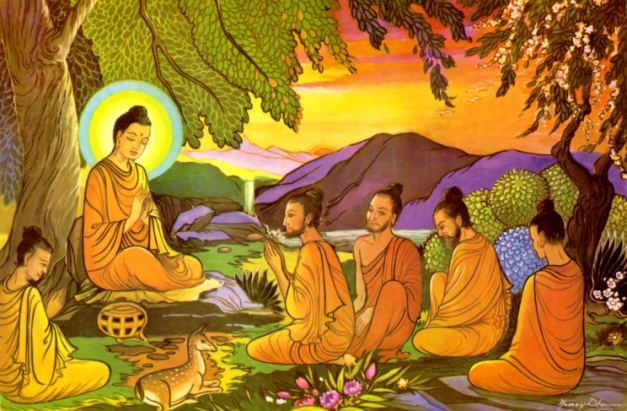-
180 August 28, 2016
-
Whatever it is be You
225 August 28, 2016 -
Four short sentences
173 August 28, 2016 -
Spiritual life is a life of search
Comment August 28, 2016Spiritual life is a life of search…but a true search.
Not to investigate and to seek what you hope to discover,
Not the object of your aspiration,
But what you are.
Meditation is just a search for the meditator.
Enlightenment is to discover…To discover that there is no discoverer, and there is nothing to discover…
Enlightenment is to be.
To be the most wonderful discovery of what can not be found.
It is to arrive to no where…
To meet no one.
You fail, because of your habit to search only for that which satisfies your needs.Get rid of all this need.
And you will see…
Get rid of all that you have.
And you will see…
Throw away all that can be thrown.
And you will see…
Give up these words, and what they make you feel
And you will see…
Give up your attempt to give up.
And you will see…
Give up your attempt to see.
Because then you will really see…
The farther the object you search for, the better eyesight you need.
That which is closest to you, you have to be.~By Swami Ramakrishnananda
-
Venerable Yasa’s efforts to hold the second Buddhist council for the offense of monks collecting money
Comment August 28, 2016
Venerable Yasa’s efforts to hold the second Buddhist council for the offense of monks collecting money
55. Venerable Yasa’s efforts to hold the second Buddhist council for the offense of monks collecting money
About 100 years after the death of the Buddha, monks of the Vajji clan did certain acts which were not becoming of monks. They begged for money, even an anna (a nickel) or two, from lay devotees who came to the monastery on Uposatha days to keep their precepts. The Venerable Yasa then said that it was not fit for monks to handle money. For that reason, they imposed a Vinaya Act on the Venerable Yasa by which it was made obligatory for the person who said so to tender an apology to lay devotees for alleged interference with their charitable motives.
The Venerable Yasa went to the lay devotees and explained the true purport of the Buddha’s teachings, and when the lay devotees understood it they showed no further respect to monks who begged for alms in cash. The Venerable Yasa approached the distinguished Arahants and asked them to adjudge the matter, and they pronounced that it was not lawful according to the Vinaya for monks to handle money. After which, 700 distinguished Arahants were chosen and the Second Buddhist Council was held to protect the Doctrine.
THE ILLUSTRATED HISTORY OF BUDDHISM
by ASHIN JANAKA BHIVAMSA (Aggamahapandita)
Artist: U Ba Kyi | Link to this post -
I walk down the street…
Comment August 27, 20161) I walk down the street.
There is a deep hole in the sidewalk
I fall in.
I am lost…
I am hopeless.
It isn’t my fault.
It takes forever to find a way out.2) I walk down the same street.
There is a deep hole in the sidewalk.
I pretend I don’t see it.
I fall in again.
I can’t believe I’m in the same place.
But it isn’t my fault.
It still takes a long time to get out.3) I walk down the same street.
There is a deep hole in the sidewalk.
I see it is there.
I still fall in…it’s a habit
My eyes are open; I know where I am;
It is my fault.
I get out immediately.4) I walk down the same street.
There is a deep hole in the sidewalk.
I walk around it.5) I walk down another street.
Poem title: Autobiography in five chapters
by Portia Nelsony -
Better…
Comment August 27, 2016Better than a thousand
Hollow words
Is one word that brings peace.Better than a thousand
Hollow verses
Is one verse that brings peace.Better than a hundred
Hollow lines
Is one line of the law, Bringing peace.It is better to conquer yourself
Than to win a thousand battles;
Then the victory is yours.~From the Dhammapada
-
Criticism
Comment August 27, 2016Criticism is the act of pointing out the inadequacies or faults in a person or thing.
While criticism is often perceived as negative it can actually have a crucial role in helping to distinguish truth from falsehood and right from wrong, particularly when assessing the different claims of religions. Given this dual quality, the Buddha said that while criticism is valid, it has to be done with circumspection.
A man once said to the Buddha that some people criticise the wrong but do not praise the worthy, others praise the worthy without criticising the wrong, some criticise the wrong and praise the worthy and others refrain from either criticising the wrong or praising the worthy. He then said to the Buddha that he believed the person who refrained from both criticism and praise is the best of the four. The Buddha responded to these observations by saying:
‘I maintain that one who criticises that which deserves criticism and praises that which deserves praise, at the right time, saying what is factual and true, is the best. And why? Because their timing is admirable.’ (A.II,97).
Two things are suggested here. Before we point out the shortcomings in something or someone, we must make sure we are acquainted with the facts and that our criticism is valid. Secondly, our criticism must be done at the right time – e.g.
when it is more likely to stimulate positive change. Criticising other people is better done in private rather than in public, to their face rather than behind their back, when we ourselves are free from the fault we are criticising and when we can honestly say that our motive is a desire to help the person.
Referring to constructive criticism, the Buddhist philosopher Nāgarjuna wrote in his Ratanavāli, ‘Rare are helpful speakers, rarer still are good listeners, but rarest of all are words that though unpleasant are helpful.’
Source: http://www.buddhisma2z.com
-
The first Buddhist council
Comment August 26, 201654. The first Buddhist council
About seven days after the Buddha had passed away, the Venerable Mahakassapa heard of His death, while he was resting on his way from Pava to Kusinara together with 500 Theras. All the junior Theras were plunged in deep grief and were weeping and lamenting. But a monk named Subhadda, who had entered the Order in his old age, was the only one that rejoiced over His death. “Grieve not, brothers,” said he, “weep not, we are now delivered of that Great Ascetic. He constantly worried us, saying ‘This is proper, this is not proper’. Now we are free to do what we like.”
These unexpected words that fell from the lips of a disciple alarmed the Venerable Mahakassapa who became very concerned about the future of the Buddha’s religious system, but kept quiet. When the Buddha’s relics had been distributed, the Venerable Mahakassapa consulted the other Theras and suggested to them to hold a Council of leading Arahants to collect, classify and rehearse the teachings of the Buddha in order to protect and fortify the Sasana against such attacks as might be expected from monks of the type of Subhadda. They all welcomed the suggestion. King Ajatasattu was informed of the intention of the Samgha, and with his help, the First Buddhist council was held at Rajagaha with 500 Arahants.
THE ILLUSTRATED HISTORY OF BUDDHISM
by ASHIN JANAKA BHIVAMSA (Aggamahapandita)
Artist: U Ba Kyi | Link to this post -
Love…
Comment August 25, 2016When your mind becomes motionless
and the brilliant eyes of the peaceful mind
take a straight look down into the depth of your heart
you will see the life-force pulsating and thriving
in the warmth of pure love.As you experience this pure love
what we all call “heart”
beams of light will begin to radiate from the center of it
for heaven is there in eternity.If you can release this radiance of love
and allow it to flow through you,
your heart will become light.
The spirit will get liberated into the air
and then, from a place of inner stillness
you will know what it would be like
to be an eagle and soar in the evening skies.And most of all,
you would understand
what it would be like
to be perfectly sane.~ By Bhante Wimala











